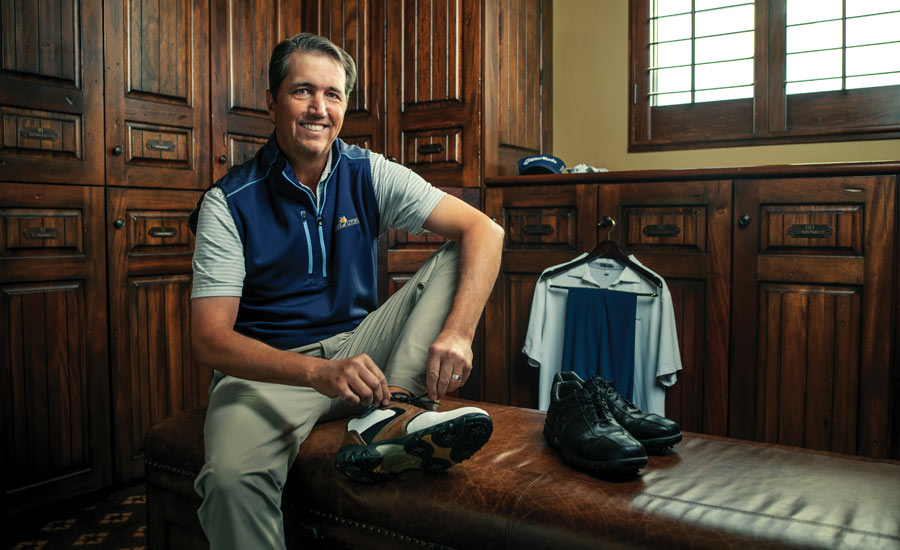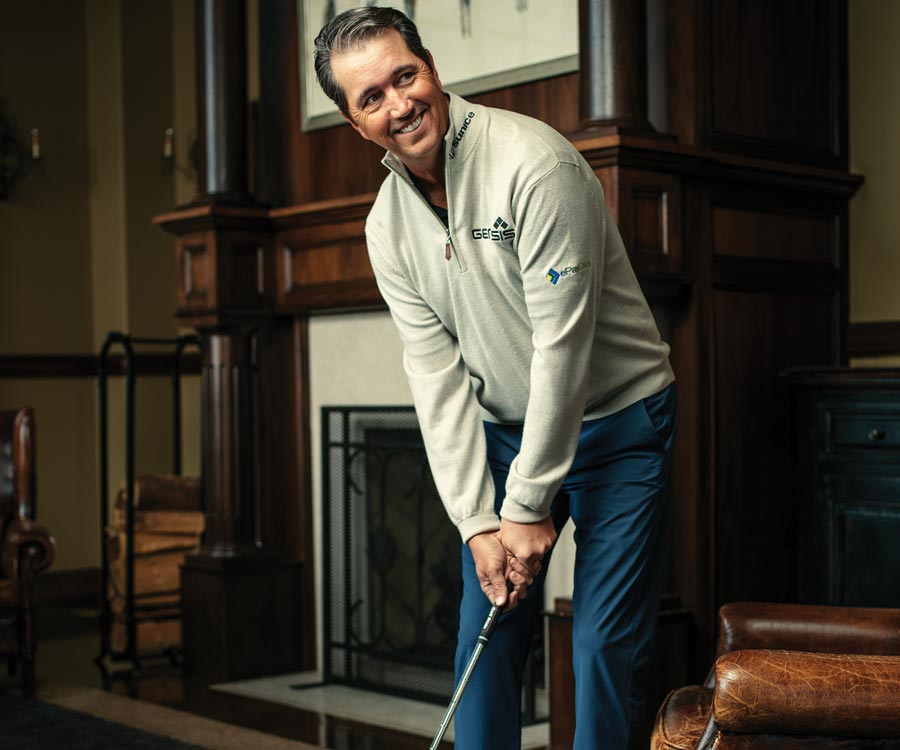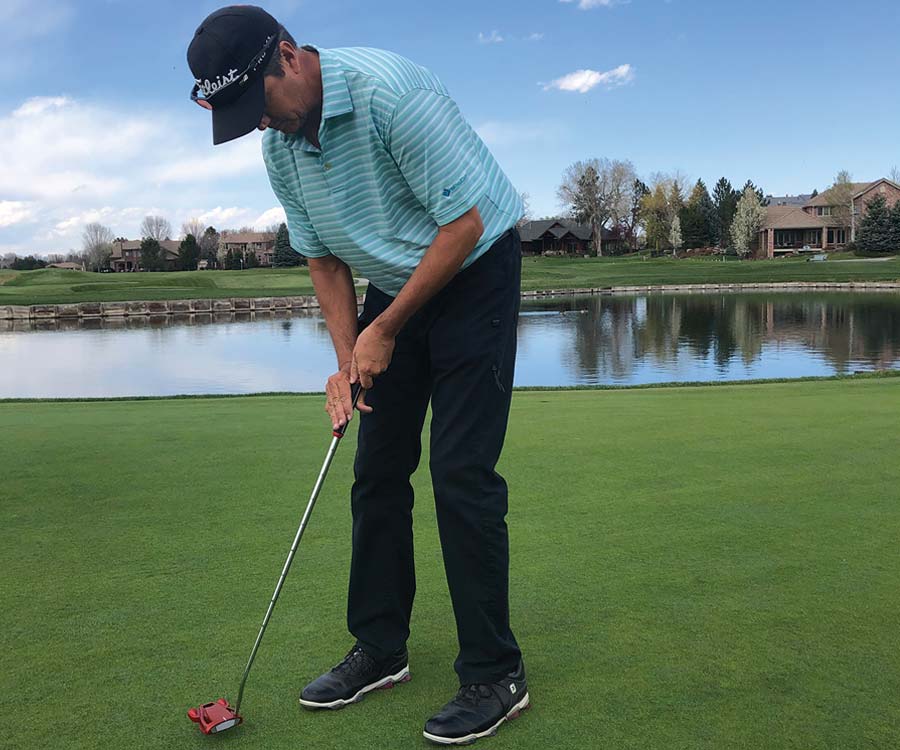SENIORS TAKE THE STAGE AT COLORADO SENIOR OPEN IN AUGUST
What to know about this year’s Colorado Senior Open

By Andy Bigford/Photographs by Ehren Joseph
IT’S A COLD mid-February day in Englewood, with Colorado golf courses in the midst of a lengthy, snow-covered, three-week-plus shutdown. Inside the comfy offices of Muscle Activation Techniques, with a wedge in hand and ping-pong balls at his feet, Shane Bertsch has almost everything he needs to stay primed for his PGA TOUR Champions debut in May: a mat, a mirror, a net, a simulator, an array of clubs and, perhaps most importantly, a dog-eared copy of Ben Hogan’s Five Lessons within arm’s reach. He’s crisply clipping the ping-pong balls over a table, occasionally checking his setup in the mirror, and explaining how a variation of a few centimeters can make all the difference.
If you are looking for someone to get behind on the Champions Tour this season, a feel-good story grounded in Hoganesque determination and grit, Colorado native and Parker resident Bertsch is your guy. In a 25-year career that defines the term “journeyman,” Bertsch bounced between the PGA and developmental tours for some 500 events, recording five top 10s on the main tour along the way. His career is perhaps best defined by this stat: He won on what’s now known as the Korn Ferry Tour in 2000, when it was sponsored by Buy.com; in 2005, when it was the Nationwide Tour (holding off Bubba Watson and Charley Hoffman down the stretch); and in 2015, when he bested Patton Kizzire and Si WooKim in a Web.com event. Bertsch also won the 1994 Southwest Kansas Pro- Am and the 1998 Colorado Open.
More than anything, his career has been marred by injury and misfortune—nothing anywhere near as severe as Hogan’s near-fatal collision with a bus, but arguably just as debilitating to a career trajectory. That includes a still-mysterious bout with vertigo in 2006, a miscommunication with the PGA TOUR that abruptly left him without status in 2009, and a series of odd broken bones and torn muscles that sidelined him just as he was gaining momentum.
Finally healthy after all these years, he is poised for redemption on the second-chance Champions Tour, the ultimate mulligan for the over-50 set. In early December, just across the street from the famed TPC Scottsdale Stadium course that annually hosts the raucous Waste Management Phoenix Open, Bertsch teed it up on the also-challenging TPC Champions course in a 78-man field, vying for one of just five exempt spots. Fourteen years earlier, he had been forced to withdraw from the Phoenix Open and enter the nearby Mayo Clinic with dizziness so bad that he couldn’t see his ball to line up a putt. After multiple MRIs and CAT scans, puzzled doctors couldn’t find the cause, and he finally overcame the illness by taking anti-anxiety drugs for about a year.

At the Champions Q-school qualifier, Bertsch started slowly with a one-under 70, but then the putts started to drop, including five birdies in a row in the third round. He closed with an emphatic 67-65-65 (267, -17), pocketing the $30,000 medalist’s check and the coveted PGA TOUR Champions card for 2020. He held off a final-round 62 by hard-charging Thongchai Jadee, who has 20 worldwide wins and is the all-time Asian Tour money winner, and Sweden’s Robert Karlsson, an 11-time winner on the European Tour. The players who didn’t earn cards included former PGA TOUR winners like Carlos Franco, Paul Stankowski and Robert Gamez, as well as major champions Shaun Micheel, Todd Hamilton and Michael Campbell.
Bertsch grew up on Floyd Hill. His father ran the Whippletree Bar in Bergen Park, and his mom worked for United Airlines. He played multiple sports as a youth; Bertsch was a promising young ski racer at Loveland, and even something of a junior tennis prodigy, until he got whipsawed by Andre Agassi in an Intermountain tournament at age 13—and opted to try golf instead. He landed a bag boy job at Evergreen Golf Course, played every day, and soon became a low single digit.
On the Evergreen High School golf team, he had the good fortune of chasing Brett Dean, who would become a two-time All-American at Arizona State University. Working bag jobs at Hiwan and then Bear Creek, Bertsch set his sights on becoming a touring professional. Rounds at Overland Park with the late, legendary Bill Bisdorf and his wife, Norma, made quite an impression. Known as “Mr. Popeye” for his incredible forearm strength, the former PGA TOUR player and three-time Colorado Open champion could still drive the ball 300 yards in his 70s.
Bertsch didn’t have that kind of length. But what the late bloomer lacked in ballstriking, he more than made up for with a world-class short game and putting stroke.
That promising but incomplete skill set fortuitously landed on the doorstep of Jesse Blackwelder, a renowned teacher, 60-year devotee to Ben Hogan’s fundamentals and, at the time, the head coach at New Mexico Junior College in Hobbs, N.M. Blackwelder would spend hours indoors each day with his student-athletes, working on the fundamentals of grip, stance and posture—and regularly reading long passages from Five Lessons to his antsy charges. Bertsch ate it up, but he would also flee to the outdoors to play as many twilight holes as he could when the study sessions ended. The fundamentals took root, and this was the beginning of a now 32-year coach-athlete relationship that is perhaps more critical today than ever before.
From the first day, “I saw that he wanted to learn, and that’s how you get here (to the Tour),” recounts Blackwelder. He now runs his busy shop out of Lubbock, has shepherded five other players to the PGA TOUR and has legions of standout Texas amateurs who swear by his rigorous methods and his genuine interest in them as people.
Coach and student still work on the Hogan fundamentals, and in a late-February check-up trip to Lubbock, the two spent eight hours in painstaking, slow-motion body movement drills indoors over two and a half days (while also squeezing in a round at the Texas A&M course). Bertsch took maybe 30 full swings the entire time and was exhausted, but the principles of takeaway, transition and follow-through were “ingrained.”
“I’m not through with him yet,” laughs Blackwelder, who is now 79 but walked most of the 72 holes (along with his wife Carol) in following Bertsch at Q-school. The coach can’t hide his enthusiasm for the opportunity ahead and his pride in his student. “He’s an unbelievable person. He’s like a son.”
As for all the dozens of new-wave instruction methods that have cropped up regularly since Blackwelder first started studying the Hogan book in 1959, neither man pays them much attention. “The fundamentals never change,” says the coach. Likewise, technological breakthroughs like Trackman are helpful, but can entice golfers to skip too many important steps.
Blackwelder’s initial tutelage back in the late 1980s got Bertsch into Texas A&M, where he finished runner-up in the Southwest Conference finals to future British Open champion Justin Leonard. But his all-world short game could only get him so far.
Steve Beach, the longtime golf instruction director at Glenmoor Country Club who had Brandt Jobe and Wyndham Clark as early pupils, welcomed Bertsch to use the club as a home base in the late 1990s. He could see all the traits that identified Bertsch as a member of the “uncommon breed” of Tour players. “He treats it like a full-time job, eight hours a day, five days a week,” Beach says. “He’s always one to have a positive attitude, to let go of the past. He never gives up.”
Which is a good thing, because in those journeyman years, the setbacks stand out more than anything. After he recovered from the mysterious bout of vertigo, he received a medical exemption to play in 2008. He started strong, and by early fall a PGA TOUR official informed him that he’d already earned enough money to qualify for full status in 2009. So he took off the end of the season, traveling with his wife, Monica, and their two daughters to North Dakota to bury the ashes of his father. Upon returning, he learned that he in fact hadn’t locked down a spot, and then watched hopelessly on TV as Colorado State grad Martin Laird poured in a 10-foot putt on the 72nd hole of the final event of the season to drop Bertsch to 126th on the money list, one spot from exemption.
Having not entered Q-school because he thought he was already in, he found himself with no status for 2009. Shortly thereafter, while walking around his house, he broke his fifth metatarsal—the little toe on his right foot. Advised by doctors that he wouldn’t need surgery, he subsequently required two. He broke his hand in 2010, and then, six years later, suffered a tear in the labrum of his left shoulder that required more surgery.
Through it all, Bertsch never had any regrets or suffered any lack of motivation, at least until he reached that shadowy period just prior to turning 50, which 40-something PGA TOUR players refer to as “purgatory.” Despite having status, he opted out of the Korn Ferry Tour for 2019, his first non-touring season since 1995. At Blackwelder’s urging, Bertsch had decided earlier to open an instruction business, and he is loved by his students in the Denver area.
Last summer, he also became the hot commodity at Telluride Ski & Golf Resort. After connecting with CEO and part-owner Bill Jensen, he accepted an invite to teach golf at the southwestern Colorado resort in one of the most scenic settings in the state. The location also afforded the opportunity to pursue his other love, fly-fishing, by combining golf instruction with guided forays to the local trout streams.
Fly-fishing also figured into the life of Shane’s brother and regular caddie, Jesse, a South Platte River guide whose new responsibilities as a fly-shop manager prompted Shane to cast for a new bag man.
The job went to Aurora’s Fred Sanders, a sage veteran, who looped for the vast majority of Kenny Perry’s 14 PGA TOUR victories and nine wins on the Champions, including four senior majors. Sanders was on the bag for victories by Kirk Triplett, Robert Damron and Russ Cochran. In detailing Sanders’ CV, Bertsch smiles. “My new caddie has made more money on the TOUR than I have.”
During his career, Bertsch traveled by RV with his family, sharing home-schooling duties with Monica until their daughters were in their teens. With Brianna headed to college in the fall, and Stella entering Bishop Machebeuf High School, it will mostly be just him and Sanders grinding it out on the Champions. Bertsch is more than confident he will pay his way with earnings; during the pre-50 stage of his career, he sought sponsorship help for only one season, and quickly reimbursed his backers. Booking air and hotel reservations for the Champions is much easier: There is no cut.
Bertsch turned 50 and therefore became Champions Tour eligible on March 30. That initially meant he’d miss the first six events of the 2020 season but would still have roughly 20 opportunities.
But then came the COVID-19 pandemic. His inaugural start was supposed to be April 17-19 in the Mitsubishi Electric Classic at TPC Sugarloaf outside Atlanta. But with that and four other events (including May’s KitchenAid Senior PGA Championship in Benton Harbor, Mich.) either canceled or postponed because of the pandemic, his debut on the senior circuit remained a moving target.
Whenever it comes, he’ll be ready. He is proud to have developed into an accurate driver of the ball and carries it 275 yards; his irons are crisp and the short game is still magnificent. While forever grounded in Hogan’s principles and indoor drills, once outside he naturally prefers to play a lot rather than practice a lot. He made several trips to Scottsdale during the winter to hone his game in warm weather and enjoys privileges at both Glenmoor and Colorado Golf Club.
At six-foot-two and 185 lbs., Bertsch may be in the best shape of his life, working out four times a week at 7 a.m. with Dave O’Mara at Viking Fitness in Greenwood Village. Even so, he’ll likely take advantage of the Champions Tour option to ride for most of his tournaments, figuring there is no downside to conserving energy. (Champions caddies must walk and carry, and Bertsch gladly obliged Sanders’ request that he use a lightweight tote instead of a 40-lb. tour bag.)
Bertsch has a Titleist ball sponsorship with a victory schedule, but his clubs are a “mixed bag,” with no fewer than five brands in the arsenal, including a TaylorMade driver and 3-wood, Cleveland 6-Wood, Callaway 4 and 5 Hybrids and Mizuno irons (note to aging amateurs: his first iron is the 6).
Even with his flat-stick prowess, Bertsch has cycled through all the grips, which is “what you do when putting for a living.” After going from regular to righthand low to claw, he recently settled on the arm-lock method (most notably employed by Matt Kuchar) that became popular after the anchored-putter ban. It requires a bulky 40-inch Odyssey putter and a lot of adjustments, but Bertsch says the results are a “hair better.”

Without explicitly saying as much, Bertsch expects to perform well in this second chance—and to win. There’s no reason to think he can’t. Brett Quigley, who finished 20 strokes behind Bertsch in Q-school, won a month later in Marrakesh in the Champions Tour’s Morocco Open, and after a T3 finish in the Cologuard Classic, Quigley stood second in the overall standings in early March with $350,000-plus in earnings.
There is a fine line between success and failure at the highest levels of golf. It’s often the flat stick that makes the difference, along with perseverance and maintaining the fundamentals through the many trials and tribulations of a grueling season. It was never smart to bet against Ben Hogan. And Shane Bertsch is a better putter.
Editor’s Note: Bertsch turned 50 on March 30. With multiple Champions Tour events either canceled or postponed due to COVID-19 concerns, the date of his debut remains uncertain. Check here for updates.
Contributing editor Andy Bigford thinks he fixed his golf setup just by talking to Shane Bertsch and Jesse Blackwelder, and absorbing a fraction of what they had to say.
This article was also featured in the April 2020 issue of Colorado AvidGolfer.
Colorado AvidGolfer is the state’s leading resource for golf and the lifestyle that surrounds it, publishing eight issues annually and proudly delivering daily content via coloradoavidgolfer.com. Follow us on Twitter, Facebook and Instagram.
What to know about this year’s Colorado Senior Open
Help your game this summer at the Insiprato Colorado Open